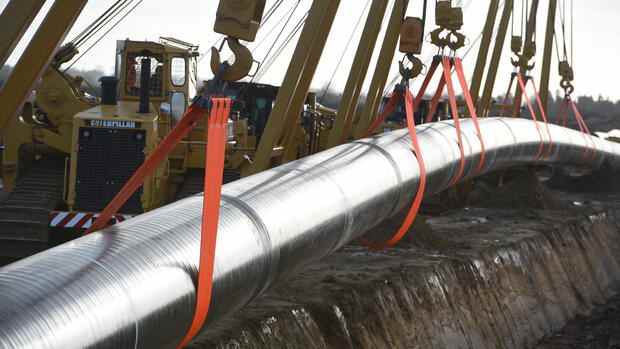Methane leaks cause massive damage to the climate.
(Photo: dpa)
Berlin Reducing CO2 emissions is the order of the day. This week and next, the World Climate Conference in Glasgow will revolve around the question of what needs to be done in order to make progress on the subject of CO2 reduction. At the same time, CO2 has become the code for man-made climate change. However, all other emissions that fuel the greenhouse effect – for example nitrous oxide or methane – should also be considered.
Climate protection organizations are focusing in particular on methane as a particularly climate-damaging gas. In fact, its climate-damaging effect is 28 times greater than that of carbon dioxide. According to the EU Commission, around half of global warming to date is due to methane emissions. And: The output continues to rise. Compared to pre-industrial times, methane levels in the atmosphere have tripled.
Some of the supposedly indisputable strategies against climate change suddenly no longer seem so convincing if methane emissions are also included. For example, in comparison to coal, the supposedly climate-friendly energy source natural gas.
This is where methane escapes during the extraction and transport of the gas – to what extent, however, is controversial and in some cases simply unknown. “We finally need mandatory measures to record and reduce methane emissions from the gas industry,” demands Sascha Müller-Kraenner, Managing Director of Deutsche Umwelthilfe (DUH). The next federal government must “give up the cuddle course with the gas industry and advocate strict guidelines and an EU-wide methane tax,” he demands.
Top jobs of the day
Find the best jobs now and
be notified by email.
And since the gas industry knows that DUH is following its concerns very consistently and has already scared entire industries, especially the automotive industry, the companies have not remained inactive.
In September, the Association of Pipeline Operators (FNB Gas), in which the large national and cross-border German gas transport companies have come together, presented the results of a pilot project to record methane emissions.
EU Commission plans regulation proposal on methane emissions
According to its own information, FNB Gas has carried out studies on around 43,000 potential sources of emissions – such as valves or gate valves – in the German gas pipeline network. According to FNB Gas, this is the “most extensive coordinated measurement of this kind to date”. The measurements were carried out by the internationally active specialist company “The Sniffers”.
According to FNB Gas, an extrapolation of the measurement results results in a share of the member companies “of about 0.06 percent of the total greenhouse gas emissions in Germany”. The result shows that the previously assumed methane emission values in the National Inventory Report can be corrected “significantly downwards”.
In addition, the operators of the gas pipelines want to intensify their efforts in the fight against leaks in the pipeline system. “We want to get better and will therefore continue the measurement initiative next year. By 2025, the members of the FNB Gas are aiming to jointly halve the emissions compared to 2015, ”said FNB Managing Director Inga Posch.
It is based on the objectives of the Oil and Gas Methane Partnership (OGMP) under the umbrella of the United Nations and its guidelines, added Posch. “An important result of our pilot project is that we will be able to eliminate sources of emissions with targeted measures in the future,” said Posch. “Half a percent of the leaks are responsible for 90 percent of the fugitive emissions,” she added.
At the end of June, the DUH had come to significantly more alarming results in its own study. After the FNB research results were published in September, the DUH followed up in October with a specific set of demands based on a study by the Ecological-Social Market Economy Forum (FÖS). Central message: The DUH is convinced that methane must have a price just like CO2. Only in this way would the necessary incentives be set for natural gas companies to record and close the climate-damaging leaks along the entire value chain.
The subject has long since acquired a political dimension. The EU Commission wants to present a regulation proposal on methane emissions within the EU in December. Among other things, gas companies are to be obliged for the first time to report on their methane emissions based on measurements and to find and close leaks.
The topic also plays a role at the World Climate Conference in Glasgow. In Glasgow, the EU is trying to move forward with the USA. The aim is to reduce methane emissions worldwide by at least 30 percent by 2030 compared to 2020.
More: The gas price shock for the global economy

